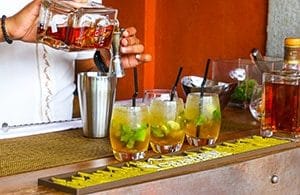
Risk Factors for Substance Abuse
Feelings of Stress and Depression…
Feelings of stress and depression can be major risk factors for substance abuse or relapse. While the holidays can be a joyful time of year, they can also expose powerful feelings of alienation, pain, or loneliness. One study found that “one of the most relevant factors in Christmas depression is the individual’s belief in the myth that everyone else is having a good time and engaged in loving family relationships—clearly a wish, but not necessarily a fact.”
Feeling of Loneliness…

Binge Drinking and Party Drugs: Substance Abuse at Social Gatherings
The study above also found increases in “alcohol-related fatalities” around the holidays. Many view the holidays as an opportunity to kick back and celebrate, often with great amounts of social pressure to let loose and “enjoy oneself” with alcohol. There is a common perception that alcohol helps one through the usual stresses the holidays can bring on. One report found that “450,000 monitored DUI offenders increased their drinking rates by 33 percent between Thanksgiving and New Year’s Day.” Similarly, holiday parties may present the risk for abuse of party drugs such as cocaine, which one study found to be even more widely used than alcohol.
Avoiding Triggers and Having a Plan
If an individual knows they will be around alcohol or similarly tempting substances during the holidays, it is crucial to have a plan in place to avoid relapse or substance abuse. Talking to family members or friends about one’s substance issues may be difficult, but seeking such help can be vital to establishing strategies to avoid substance misuse. Avoiding substance abuse triggers, such as specific people or situations that influence one to use, is the best strategy. However, if one must be present where such substances are being consumed, setting a time limit at the event, asking friends to intervene if one begins to use, or finding ways to remove oneself from the immediate area where alcohol is present can be smart strategies to avoid substance abuse.
Top Tips for Avoiding Substance Abuse at the Holidays
So, to review, the holidays can be fraught with parties and people drinking and using, but you don’t have to. There are many ways to avoid the risk of relapse, with a little planning beforehand.
- Bring Your Own Drinks (Non-Alcoholic). You can make your own mocktail ingredients, and avoid the temptation and conversation altogether.
- Bring a Sober Friend. You’ll be in it together, and less likely to feel like the only one not drinking or using.
- Choose an Arrival/Departure. Decide ahead of time with your friend, when to go and when to leave. That way you can socialize, but also get out of there before the party gets too spirited. Plus, it’s a good idea in general to limit your time around potential triggers, be they substances and/or situations.
- Get Up and Move Around. The more you’re moving around, the less likely you’ll be sitting and thinking about getting a drink or [insert substance of your choice].
- Have a Response Ready. The people at the party may or may not know you have a problem; the important part is, they don’t need to. If you don’t want to have to go down that rabbit hole of conversation discussing recovery, have a response ready when someone asks you if you want a drink. Easy enough are responses such as, “I have a race I’m running tomorrow” or simply, “I have to get up early tomorrow” will do the trick.
- Just Say No…. Of course, right? In this context though, we mean it’s ok to just say no to the party or celebration. You certainly don’t have to go to every holiday party you get invited to, and there’s a billion excuses you could use, if you’re not comfortable just saying no. Things such as “I’ve got a lot on my plate” or “I still have shopping to do before Christmas” or “I have another party” work well enough. You can even plan to meet after the holidays and buy them coffee or see a movie to make it up to them, if you want to.
Drug Addiction Treatment at Granite Recovery Centers


















